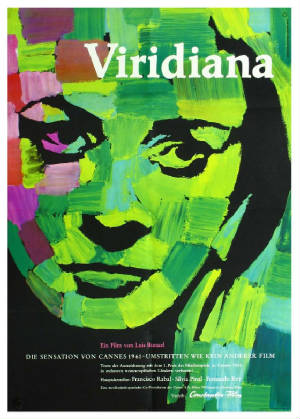|
|
 |
|

(1961, directed by Luis Buñuel)
- inducted 2017 –
“Viridiana marked Luis Buñuel’s return to shooting films in his home country of Spain. His decision raised
as many eyebrows as his Palme D’Or-winning film ultimately did. For biting the hand that thought it was feeding him,
Buñuel had his most delicious provocation banned by the Catholic Church and Franco’s government of Spain. This turn
of events must have generated for Buñuel the same level of wicked amusement Viridiana’s Don Jaime (Fernando Rey)
expresses just before writing his suicide note. Don Jaime’s death frees him from his self-imposed loneliness but entraps
his niece, Viridiana (Sylvia Pinal). Viridiana bears a striking resemblance to Don Jaime’s late wife, especially when
she gives into his fetishistic fascinations by dressing in her aunt’s wedding gown. But the ruse can only go so far;
Viridiana rejects her uncle’s subsequent marriage proposal. After all, she’s a novice about to take her vows at
the convent. As the Spanish government should have expected of Buñuel, Don Jaime realizes that people don’t change their
natures on a whim.
“So Don Jaime offs himself, but not before violating Viridiana after she’s been drugged by his faithful servant.
Yet Don Jaime’s guilt keeps Viridiana’s virtue intact. Despite Buñuel’s characteristic obsession with shoes
and feet (at one point, Don Jaime wears his wife’s shoe, which fits his foot as poorly as Cinderella’s glass slipper
fit her wicked stepsister), Viridiana’s virtue is the film’s real fetish object. And it’s not just purity
of the sexual variety; much is made of Viridiana’s attempt to bring the Christian charity she learned at the convent
to Don Jaime’s home. Recruiting several homeless people to live in the home she and Don Jaime’s son, Jorge (Francisco
Rabal) inherited, Viridiana becomes as committed to their care as Don Jaime was to his late wife’s image. So Viridiana
exchanges a lustful fantasy for a supposedly more saintly devotion, then levels a stronger punishment at the latter.
“Upon reading the script, the Spanish censors’ only objection was to the film’s ending. Buñuel changed it
to something far more implicitly dirty, proving the tried and true adage that it’s easier to fool the censor’s
ears than eyes. Somehow, the censor also failed to take notice of Viridiana’s phallic use of a child’s
jump rope, its bemused mockery of belief systems and the film’s most hilariously memorable and controversial blaspheme,
a recreation of Da Vinci’s The Last Supper featuring the type of lost souls Jesus would have hung out with back
in His day. Viridiana is Buñuel’s masterpiece, the film where his desires, complaints and askew sense of humor
combine in perfect configuration. It’s the quintessential Buñuelian masterwork.”
~ Odie Henderson
|
 |
|
Principal cast: Silvia Pinal, Francisco Rabal, Fernando Rey, José Calvo, Margarita Lozano, José Manuel
Martin, Victoria Zinny, Luis Heredia, Joaquin Roa, Lola Gaos, Maria Isbert, Teresita Rabal, Claudio Brook (uncredited)
Written by: Julio Alejandro, Luis Buñuel
Based on the novel Halma by Benito Pérez Galdós
Produced by Gustavo Alatriste
Executive producers: Ricardo Muñoz Suay, Pere Portabella
Cinematography by Jose F. Aguayo
Set decoration by Francisco Canet
Film editing by Pedro del Rey
Original music by Gustavo Pittaluga
Sound by: A. Garcia Tijeras
Assistant direction: Juan Luis Buñuel
Spain
Duration: 90 minutes
Languages: Spanish
Filmed in black and white
Sound mix: Mono (Klangfilm-Magnetocord)
Cinematographic process: Spherical
Aspect ratio: 1.66:1
Printed film format: 35mm
Produced by Union Industrial Cinematografica, Gustavo Alatriste, Films 59
Released in USA by Kingsley-International Pictures
Premiered at the Cannes Film Festival on May 17, 1961
USA release date: March 19, 1962
Awards and honors:
- Selected as one of Roger Ebert’s “Great Movies,” April 29, 2010
- Cannes Film Festival, 1961: Palme d’Or (winner)
|
 |
|
|
 |
|
|
 |
|
|
|
|
|
|
 |

